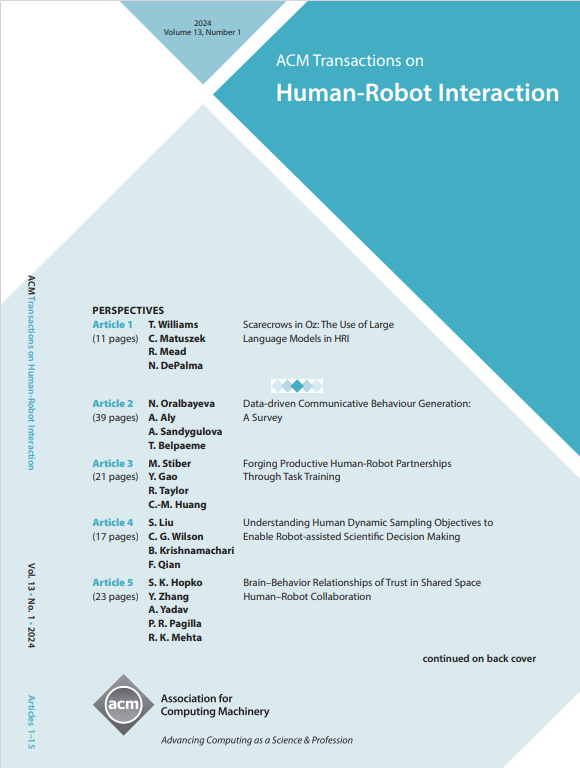数据驱动的交际行为生成:一项调查
IF 5.5
Q2 ROBOTICS
引用次数: 0
摘要
近年来,数据驱动行为生成系统的发展已成为人机交互(HAI)和人机交互(HRI)领域中备受关注的焦点。尽管基于规则的方法多年来占主导地位,但事实证明,这些方法缺乏灵活性,开发成本高昂。开发生产规则的困难,以及为了生成人工行为而需要手动配置,限制了基于规则的行为的复杂性和多样性。相比之下,使用跟踪和记录设备收集的实际人机交互数据使得使用机器学习,特别是近年来的深度学习,可以生成类似人类的多模态共语音行为。本调查概述了基于深度学习的协同语音行为生成模型的最新进展,并对该领域的未来研究进行了展望。本文章由计算机程序翻译,如有差异,请以英文原文为准。
Data-Driven Communicative Behaviour Generation: A Survey
The development of data-driven behaviour generating systems has recently become the focus of considerable attention in the fields of human-agent interaction (HAI) and human-robot interaction (HRI). Although rule-based approaches were dominant for years, these proved inflexible and expensive to develop. The difficulty of developing production rules, as well as the need for manual configuration in order to generate artificial behaviours, places a limit on how complex and diverse rule-based behaviours can be. In contrast, actual human-human interaction data collected using tracking and recording devices makes human-like multimodal co-speech behaviour generation possible using machine learning and specifically, in recent years, deep learning. This survey provides an overview of the state-of-the-art of deep learning-based co-speech behaviour generation models and offers an outlook for future research in this area.
求助全文
通过发布文献求助,成功后即可免费获取论文全文。
去求助
来源期刊

ACM Transactions on Human-Robot Interaction
Computer Science-Artificial Intelligence
CiteScore
7.70
自引率
5.90%
发文量
65
期刊介绍:
ACM Transactions on Human-Robot Interaction (THRI) is a prestigious Gold Open Access journal that aspires to lead the field of human-robot interaction as a top-tier, peer-reviewed, interdisciplinary publication. The journal prioritizes articles that significantly contribute to the current state of the art, enhance overall knowledge, have a broad appeal, and are accessible to a diverse audience. Submissions are expected to meet a high scholarly standard, and authors are encouraged to ensure their research is well-presented, advancing the understanding of human-robot interaction, adding cutting-edge or general insights to the field, or challenging current perspectives in this research domain.
THRI warmly invites well-crafted paper submissions from a variety of disciplines, encompassing robotics, computer science, engineering, design, and the behavioral and social sciences. The scholarly articles published in THRI may cover a range of topics such as the nature of human interactions with robots and robotic technologies, methods to enhance or enable novel forms of interaction, and the societal or organizational impacts of these interactions. The editorial team is also keen on receiving proposals for special issues that focus on specific technical challenges or that apply human-robot interaction research to further areas like social computing, consumer behavior, health, and education.
 求助内容:
求助内容: 应助结果提醒方式:
应助结果提醒方式:


